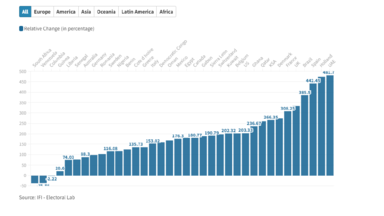
Electoral Lab
Ibrahim
Jouhari
Expats Turnout Analysis
The turnout of the expatriate voters has been above average, topping 63.05% overall, up from 56.4% in 2018. In absolute numbers, the votes rose from 46,799 in 2018 to 142,041 in 2022, almost reaching three times the number of votes in 2018. It is safe to say that the expatriates have delivered. The ball is now in the hands of the 3,744,959 Lebanese registered to vote locally.
